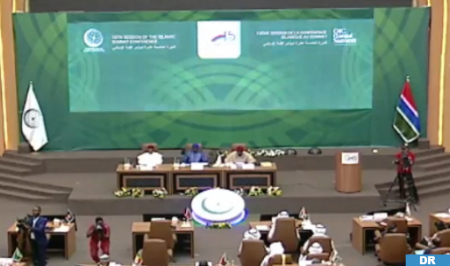
The 15th Summit of the Organization of Islamic Cooperation (OIC), held in Banjul, capital of The Gambia, May 4-5, hailed Morocco’s initiatives at regional and multilateral levels.
In its final communiqué, the OIC Summit commended the “Rabat Declaration”, adopted at the end of the High-Level Ministerial Conference on Middle-Income Countries in February 2024, which called for consolidating the participation of these countries in global governance and promoting the Middle-Income Countries Friendship Group, to become an official governmental platform for dialogue, awareness-raising and coordination on development issues.
The Summit also praised the Kingdom’s efforts in the fight against terrorism, welcoming the United Nations’ choice of Morocco as a partner to host the United Nations Program Office for Counter-Terrorism and Training in Africa.
The Banjul Summit hailed Morocco’s experience in the fight against terrorism, through its chairmanship of the think tank of the Global Coalition to Defeat Daesh/ISIS in Africa, and the Kingdom’s organization of a meeting of foreign ministers of the Global Coalition to Defeat Daesh in Marrakech on May 11, 2022.
In the field of migration, the OIC Summit commended the pioneering role of King Mohammed VI as Champion of migration issues at the African level, and Morocco’s pursuit of its role as a leading country in the implementation of the Global Compact on Migration.
The Final Communiqué of the Summit also praised the Kingdom’s efforts to reconcile the points of view of the Libyan protagonists.
“The Summit welcomes the efforts made by the Kingdom of Morocco to bring together the points of view of the Libyan protagonists and bring them to the dialogue table, within the framework of a series of meetings held in Morocco, with a view to advancing the process of a political solution, in accordance with the Skhirat agreement reached in 2015 to achieve the expected political settlement,” the Communiqué emphasized.
On another note, the Summit welcomed Morocco’s election to head the United Nations Human Rights Council (UNHRC) for the year 2024, a token of the international community’s recognition of its role in defending core human rights issues.
It also hailed the Marrakech Declaration, the outcome of the first International Seminar on National Mechanisms for Implementation, Reporting and Follow-up (NMIRFs) in the field of human rights, held in Marrakech in December 2022.
Similarly, the OIC Summit welcomed the technical support provided by Morocco to increase agricultural capacity and enhance food security in many parts of the world, by dedicating more than a quarter of its fertilizer production capacity to a number of countries with fragile agricultural systems, and also by allocating 4 million tons of fertilizer to improve food security in Africa during 2023, which is likely to increase the productivity of 44 million farmers in 35 countries.
The Banjul Summit also commended Morocco’s achievement of “Sectoral Dialogue Partner Status” with the Association of Southeast Asian Nations, crowning the process of dynamic partnerships between Morocco and the countries of Southeast Asia.
In addition, it praised the pioneering role of the Mohammed VI Center for Dialogue of Civilizations in the Chilean city of Coquimbo, as a bridge of civilizational communication between the Islamic world and the Atlantic countries of Africa and Latin America in particular.
In this connection, the 15th OIC Summit welcomed the resolution proposed by Morocco and unanimously adopted by the United Nations General Assembly on July 25, 2023, on promoting interreligious and intercultural dialogue and tolerance in countering hate speech.
On the other hand, the final communiqué commended Morocco’s inclusion of the Malhoun heritage on the list of Intangible Cultural Heritage of Humanity, at the 18th session of UNESCO’s Intergovernmental Committee for the Safeguarding of the Intangible Cultural Heritage, held in Botswana in November 2023, as an international recognition of Morocco’s efforts to protect and enhance tangible and intangible cultural heritage, bringing to 14 the total number of cultural properties inscribed on UNESCO’s List of Intangible World Heritage.
